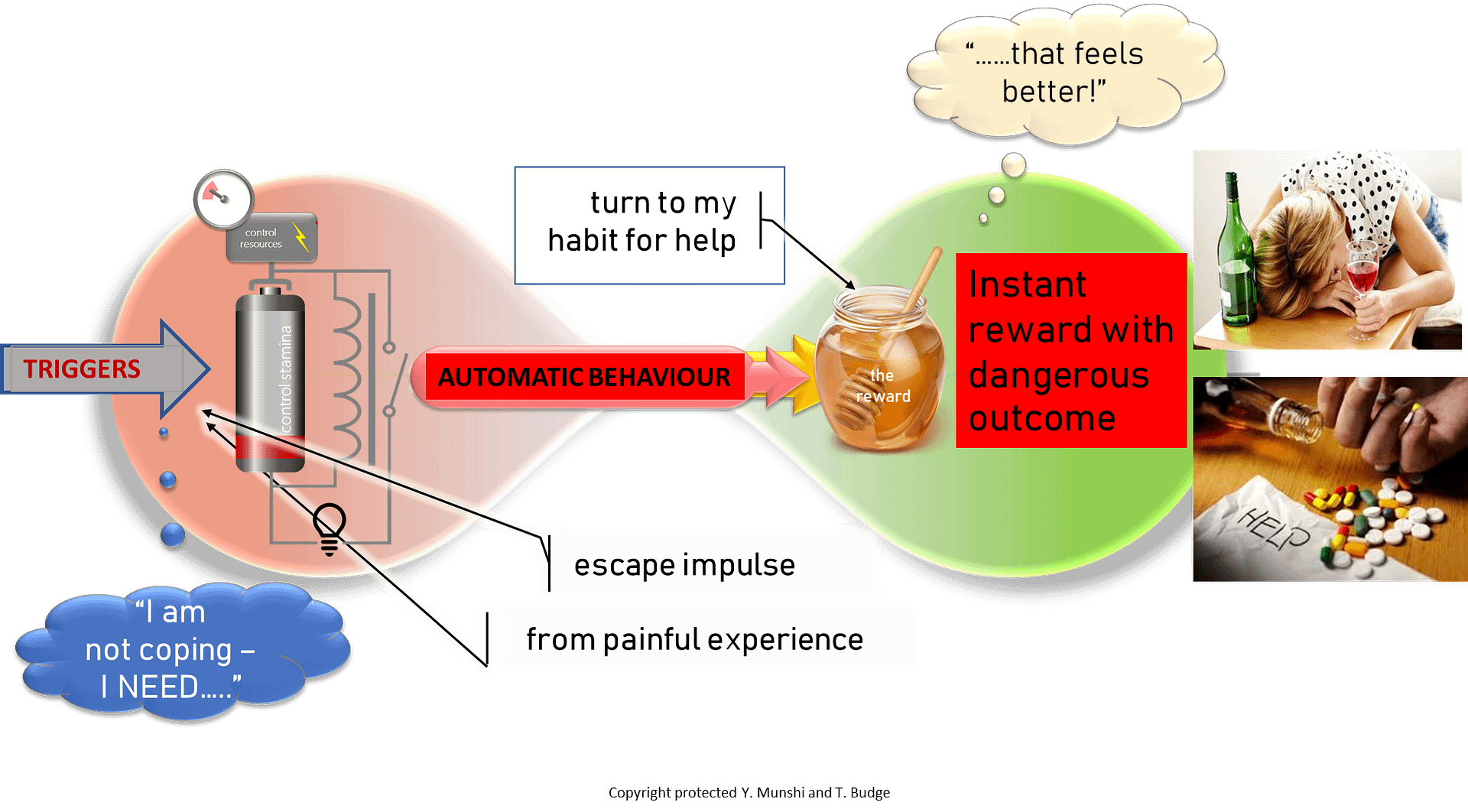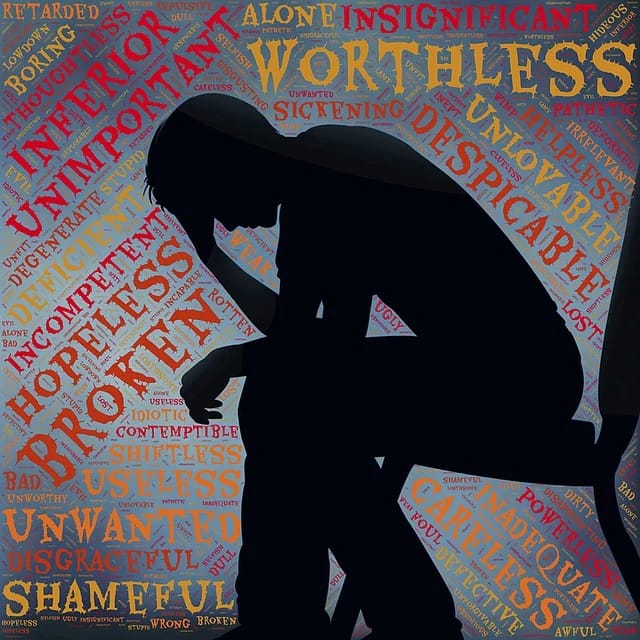Pressure of our performance society "more is never enough".
The pressure of meritocracy and traditional education, reinforced by statements like “You could do much better,” can instil a deep-seated belief of “I am not good enough.” This mindset can spiral into “No matter what I do, it will never be enough,” ultimately leading to the defeatist thought: “I might as well give up.”

Parental remarks like “You could do much better” are often intended to encourage children but can instead have the opposite effect, fostering a negative inner dialogue that, if left unaddressed, may persist for a lifetime. As these individuals grow into adulthood, they risk losing motivation and a sense of purpose, potentially leading to depression, burnout, or illness—especially when they turn to escape behaviours such as excessive consumption of sensory stimulants. This can ultimately increase their vulnerability to addiction.
Below are five key reasons why people become trapped in these destructive cycles:
1) Escape emotional pain
One might be tempted to escape the pain of destructive self-conviction by self-medicating – whether through the overuse of medication or harmful substances to artificially create a sense of calm, relieve anxiety or improve sleep – even if only for a short while. This escape may bring temporary relief and a brief sense of calm, but ultimately it offers the brain nothing more than a short-lived, artificial pause.
2) Escape from the stress of high workload
An excessively high workload can drive people to cope in two distinct ways:
- Dulling the mind: Some turn to alcohol, medication or other substances to soothe their anxiety, as these temporarily boost dopamine (the brain’s reward chemical) and GABA (a calming neurotransmitter). This numbs the nervous system, reduces performance anxiety, and ultimately decreases brain activity—impairing cognitive function in the long term.
- Overstimulating the brain: Others rely on stimulants to artificially increase their performance capacity. This temporarily heightens brain activity, creating a short-lived boost in output to manage the workload. However, once the effects wear off, the crash can numb and alter essential brain circuits needed for long-term well-being and survival.
3) Discharged batteries: stress overload, exhaustion, unhappiness = loss of control stamina

Anyone overwhelmed by stress, unhappiness, or a lack of personal time—struggling to cope—will eventually burn out. This depletion leads to low dopamine and serotonin levels, reducing stamina and self-control. As a result, the temptation to seek instant gratification—the quick “honey” of immediate rewards—becomes much stronger.
A lack of public awareness about how these harmful behaviours affect the brain can lead to complacency, making people more likely to rely on quick fixes rather than exploring natural ways to boost these essential brain chemicals. When these coping mechanisms turn into habits, the brain begins to adapt, and what starts as a habit can gradually develop into an addiction.
4) Escaping social inadequacies
In an increasingly virtual world, people are losing the ability to interpret body language, tone of voice, and other essential social skills, leading to greater isolation. As a result, depression rates continue to rise.
Younger generations in particular, may try to overcome social anxiety through binge drinking at parties, often engaging in risky or illicit behaviours. This happens because ethanol—the toxic component of alcohol—weakens the brain’s natural STOP-signal, which is responsible for self-control. When this mechanism is disrupted, the GO-signal takes over, leading to impulsive actions. In extreme cases, excessive drinking can override the brain’s protective functions entirely, resulting in a comatose state.
In this increasingly virtual and online world mankind is losing the ability to read body language, tone of voice and other social skills and people are increasingly isolate themselves. The rate of depression is climbing steadily. The younger generations often try to overcome their social inhibitions at rave parties with binge drinking that leads to illicit actions. How does this happen?
The answer is that ethanol, the toxic compound of alcoholic beverages, weakens the neurologically controlled stop signal. At that moment, the natural stop signal is disrupted, and the GO signal takes over. Uncontrolled drinking often leads to a comatose state because the protective brain circuitry has been suspended.
The trap of INSTANT gratification
In today’s fast-paced digital world, everything is expected to happen instantly, consuming our free time, increasing stress, and depleting the brain’s natural feel-good chemicals.
By contrast, natural gratification—such as meditation, exercise, or a walk in nature—requires time before its benefits are felt. Delayed gratification, like completing a course or mastering a skill, can take weeks, months, or even years. But in a performance-driven society, people crave an immediate mood boost, leading them to seek instant gratification through harmful habits that trigger unnatural dopamine spikes in the brain’s reward system. These fleeting bursts of pleasure encourage repeated use, reinforcing a cycle of dependence.
This shift from delayed to instant gratification is a hallmark of addiction. Over time, repeated destructive behaviours alter the brain’s control systems, turning occasional indulgence into compulsion…. “I can’t say no anymore” or “I need this just to get through the day.”
What feels like a loss of willpower is in reality, a change in brain function. Yet, society often misjudges those trapped in these cycles of addiction as weak or lacking discipline. What many fail to recognize is that willpower depends on a healthy brain—and these self-destructive habits have altered the brain’s very structure.

Which brain do you want? A brain caught in a snare. Or a vibrant one?
What can you do?
Learn through our Bliss Breakthrough Process how to get out of these vicious cycles, how to implement healthy coping strategies and to set yourself free and find fulfilment in life.
Find out now how big your problem might already be -> Take the quick test to break through -> and secure yourself a free consultation with Yvonne.
Your free 15 minute appointment
Would you like to know how to rid yourself of bad habits and regain your freedom?
Many have already found their liberation and happiness
through the “Bliss Breakthrough Process”.
Then book a 15 minute free consultation with me now and find out how to enter life strong, self-determined and become fulfilled and successful.


